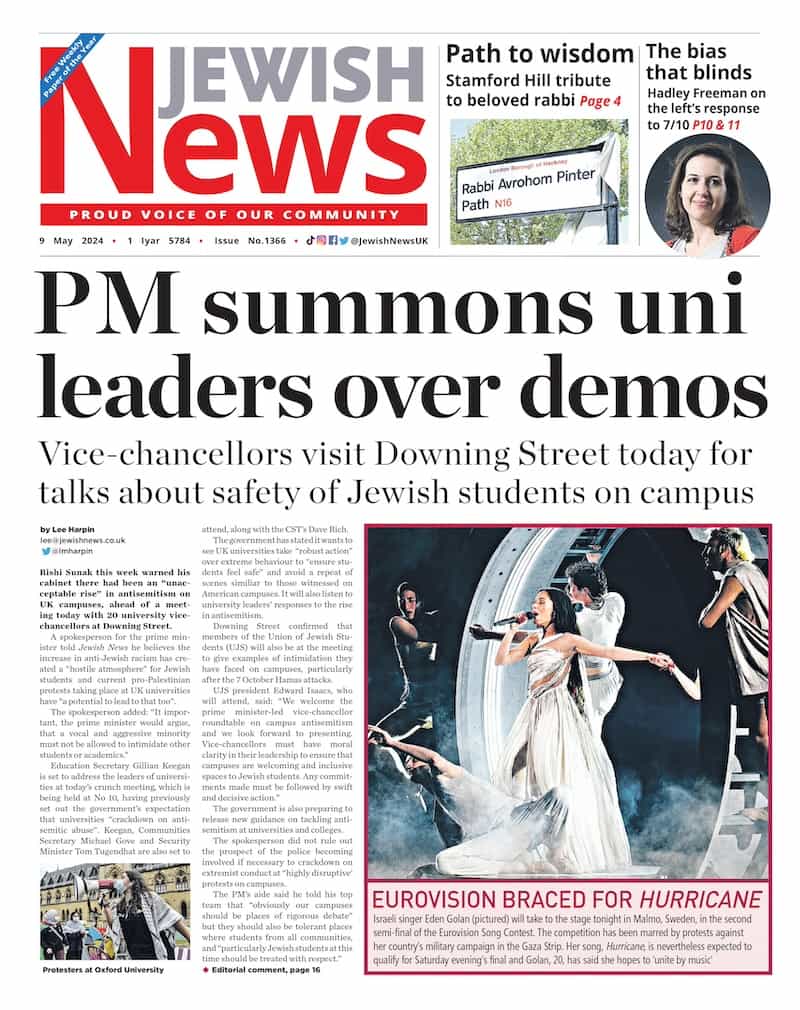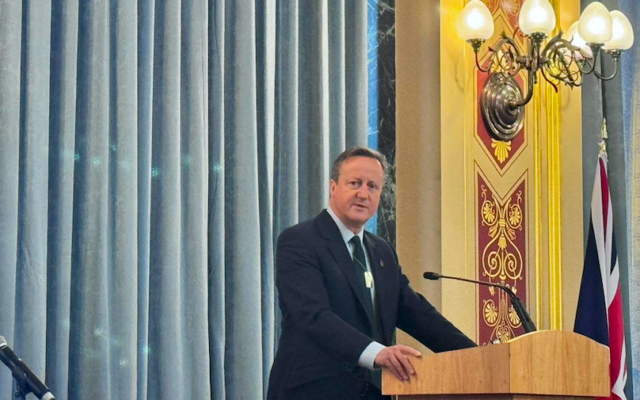Cameron: Looking at possible Palestinian state recognition isn’t rewarding terrorism
Speaking in the House of Lords on Tuesday, Lord Cameron said Hamas does not believe in a two-state solution, and so “of course it isn’t rewarding Hamas”.
Taking steps towards potentially recognising a Palestinian state as part of a peace process “isn’t rewarding Hamas”, Lord David Cameron has said.
The Foreign Secretary was defending past remarks which prompted a backlash a few weeks ago when he discussed the need to give the “Palestinian people a political horizon” as part of efforts to end the Israeli-Hamas war.
Lord Cameron said at the end of January: “We should be starting to set out what a Palestinian state would look like – what it would comprise, how it would work.”
Speaking in the House of Lords on Tuesday, Lord Cameron said Hamas does not believe in a two-state solution, and so “of course it isn’t rewarding Hamas”.
He suggested recognition “should not be the first thing we should do”, warning against taking pressure “off the Palestinians to reform”, but said: “Just because it doesn’t happen in the beginning doesn’t mean it has to wait right until the end.”
Although he insisted his remarks in January were in line with the UK’s longstanding position on the issue, he also suggested they had swayed opinion in Washington.
He said: “After I made my statement, which is absolutely in line with our longstanding policy that recognition should come when it gives the maximum impetus and input to a solution, after that, the Americans announced that they were re-examining their policy and looking at options to see if they could examine how best recognition could play a part in bringing a two-state solution about.”
He also told peers: “This Government has always supported a two-state solution, and that remains the case. Clearly, recognising a Palestinian state at the right time is part of that policy.”
Conservative peer Lord Jackson of Peterborough said: “Palestinian statehood is, I trust, something all of us in this House wish to see.
“But does (Lord Cameron) share my very grave concerns that premature unilateral recognition of a Palestinian state now risks rewarding Hamas, playing into Iran’s hands, and perhaps jeopardising the chances for a long-term sustainable peace?”
Lord Cameron said: “I absolutely understand where (Lord Jackson) is coming from. I would just say to him that of course it isn’t rewarding Hamas. Hamas don’t believe in a two-state solution. They believe in the destruction of Israel.”
He said the point of a two-state solution is to “create long-term sustainable peace”, adding: “I think that the last 30 years have shown that we won’t solve this problem without a solution that gives dignity and security to Palestinian people as well as giving vital security to Israel.
“So I say this as a strong friend of Israel. This is the right approach and we should pursue it.” He also said recognition of a Palestinian state should not be a first step.
The peer said: “Recognition is obviously part of a two-state solution, and it is something that should help with the momentum.
“The point I have been making is it should not be the first thing we should do. I think that would take the pressure off the Palestinians to reform, the things that need to happen in the Palestinian Authority.
“But just because it doesn’t happen in the beginning doesn’t mean it has to wait right until the end.”
Addressing a question on whether he discussed the issue with the US before making his remarks a few weeks ago on recognition, Lord Cameron said: “We discuss all issues relating to the conflict in Gaza and Israel-Palestine relations, but ultimately I’m pleased to tell (Lord Jackson) that the UK has a sovereign and independent foreign policy.”
The Foreign Secretary said there will be a meeting of European and Arab states on Friday in the hopes of forming a contact group to try to facilitate an end to the conflict in Gaza.
He said: “At the Munich Security Conference on Friday, there will be a meeting of the key European countries that help to fund the Occupied Palestinian Territories and the key Arab states and Gulf states that are working to help support a future Palestinian authority, and we very much hope the Secretary of State for the United States will be there as well.
“This isn’t yet the formation of a contact group. There are a number of countries, particularly in the Arab world, who are understandably nervous of meeting in advance of a proper ceasefire and plan towards a cessation of hostilities, but I think we are on the way to getting this group… up and running.”
Lord Cameron said the UK would continue to challenge Israel over “individual episodes” of its campaign in Gaza.
He later added that while Israel was responding to the “biggest pogrom since the Holocaust in terms of the loss of life of Jewish people” it had to obey international humanitarian law.
The Foreign Secretary said: “Let’s be clear, that involves not only what the IDF do in terms of the way they prosecute their actions in terms of this war but it also means as they are the occupying power in Gaza, that they have to make sure that humanitarian aid, that food and water and shelter are available to people in Gaza, because if they don’t do that that would be a breach of international humanitarian law as well.”

Thank you for helping to make Jewish News the leading source of news and opinion for the UK Jewish community. Today we're asking for your invaluable help to continue putting our community first in everything we do.
For as little as £5 a month you can help sustain the vital work we do in celebrating and standing up for Jewish life in Britain.
Jewish News holds our community together and keeps us connected. Like a synagogue, it’s where people turn to feel part of something bigger. It also proudly shows the rest of Britain the vibrancy and rich culture of modern Jewish life.
You can make a quick and easy one-off or monthly contribution of £5, £10, £20 or any other sum you’re comfortable with.
100% of your donation will help us continue celebrating our community, in all its dynamic diversity...
Engaging
Being a community platform means so much more than producing a newspaper and website. One of our proudest roles is media partnering with our invaluable charities to amplify the outstanding work they do to help us all.
Celebrating
There’s no shortage of oys in the world but Jewish News takes every opportunity to celebrate the joys too, through projects like Night of Heroes, 40 Under 40 and other compelling countdowns that make the community kvell with pride.
Pioneering
In the first collaboration between media outlets from different faiths, Jewish News worked with British Muslim TV and Church Times to produce a list of young activists leading the way on interfaith understanding.
Campaigning
Royal Mail issued a stamp honouring Holocaust hero Sir Nicholas Winton after a Jewish News campaign attracted more than 100,000 backers. Jewish Newsalso produces special editions of the paper highlighting pressing issues including mental health and Holocaust remembrance.
Easy access
In an age when news is readily accessible, Jewish News provides high-quality content free online and offline, removing any financial barriers to connecting people.
Voice of our community to wider society
The Jewish News team regularly appears on TV, radio and on the pages of the national press to comment on stories about the Jewish community. Easy access to the paper on the streets of London also means Jewish News provides an invaluable window into the community for the country at large.
We hope you agree all this is worth preserving.






















